Happy Friday! Election Day is 32 days away. We also have an announcement: Dispatch Politics is hitting the road all next week, reporting from Pennsylvania. We’ll be in the Keystone State to tell the stories from what may be the keystone to both presidential candidates’ paths to victory. (Forgive us for mixing our metaphors here.)
Up to Speed
- Melania Trump gives an endorsement of legal abortion in her memoir to be released next week, the Guardian reported Wednesday. “Restricting a woman’s right to choose whether to terminate an unwanted pregnancy is the same as denying her control over her own body. I have carried this belief with me throughout my entire adult life,” she reportedly writes. The day after the report came out, the former first lady posted a promotional video for the book on X in which she asks, “What does, ‘My body, my choice,’ really mean?”
- Democrats fear that Sen. Tammy Baldwin of Wisconsin could suffer an upset at the hands of Republican challenger Eric Hovde, Axios reported Tuesday. Internal polling shows the two-term incumbent ahead of Hovde by 2 points, closer than many recent public polls have shown. What’s more, Republicans have a $3.5 million advantage in ad buys in the final month of the election, thanks in large part to a recent cash infusion from the Senate Leadership Fund, a super PAC tied to Senate Minority Leader Mitch McConnell.
- Rep. Mike Lawler of New York, a Republican who is in a tough reelection battle this cycle, saw his race become more difficult Thursday, as the New York Times reported that he darkened his skin as part of a Michael Jackson costume while he was in college. The congressman, a hardcore fan of the late pop singer, told the newspaper that “the ugly practice of blackface was the furthest thing from my mind,” but it remains to be seen whether voters in his swing district will view it the same way. The news comes just over a week after the Times reported that another vulnerable New York Republican, Rep. Anthony D’Esposito, put a mistress on his House office’s payroll.
Cheney Cites ‘Duty to Our Constitution’ in Backing Harris
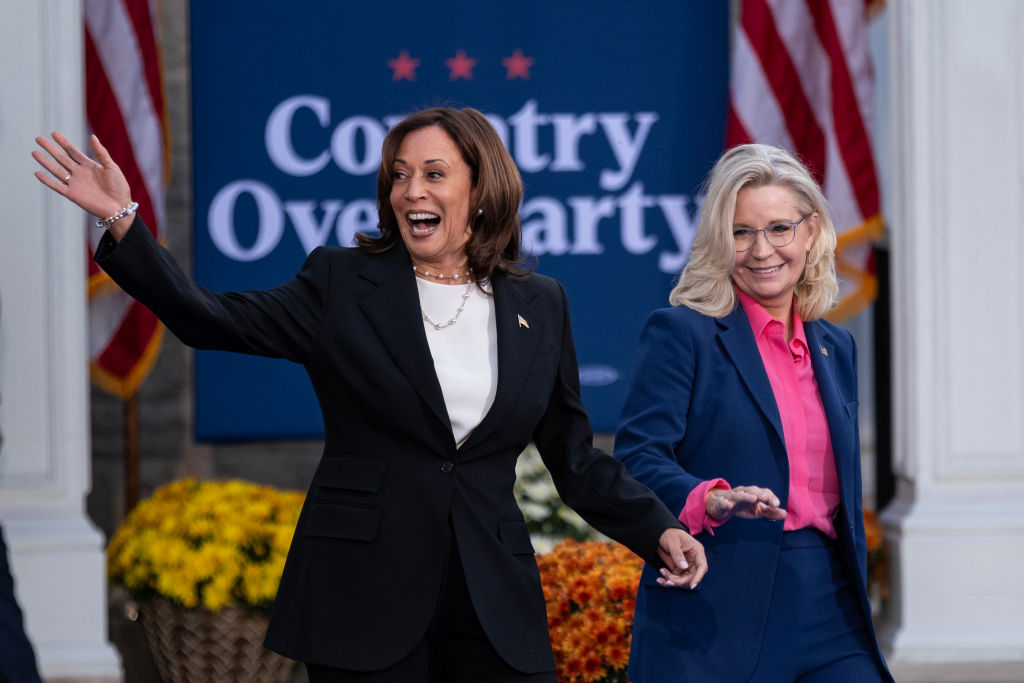
RIPON, Wisconsin—In a speech before an enthusiastic crowd Thursday in the town known as the birthplace of the Republican Party, former Wyoming Rep. Liz Cheney recalled her last campaign visit to Wisconsin—a tour of Lambeau Field in 2004—and, in a remarkable display of cross-partisan comity, resisted the temptation to mock John Kerry, the 2004 Democratic nominee for president who mistakenly called the hallowed football stadium “Lambert Field.”
Then Cheney formally endorsed Kamala Harris for president as the two stood together before the cheering audience.
In remarks replete with allusions to Republican history and conservative principles, quoting Abraham Lincoln and Charles Krauthammer, Cheney portrayed Harris as the only candidate in the race who would follow the rule of law and honor her oath to protect the Constitution. “In this election, a broad coalition has come together to support Vice President Kamala Harris,” Cheney said. “Now we may disagree on some things, but we are bound together by the one thing that matters to us as Americans more than any other. And that’s our duty to our Constitution and our belief in the miracle and the blessing of this incredible nation.”
Cheney’s appearance comes nearly a month after she said publicly she would be voting for Harris because of what she described as “the danger that Donald Trump poses.” And it may be the most notable among the several high-profile Republicans have expressed support for the Democratic vice president in recent weeks, a list that includes former Sen. Jeff Flake of Arizona, more than a dozen other former members of the House, dozens of former national security officials who served in GOP administrations, and Cheney’s own father, former Vice President Dick Cheney.
The endorsements are part of a conscious effort by Harris to court Republican voters on Republican terms. Even before Joe Biden withdrew from the race, the Democratic campaign had hired Austin Weatherford, a campaign aide to former Republican congressman (and Harris supporter) Adam Kinzinger. And in August, the campaign launched a “Republicans for Harris” outreach program, followed by appearances at the Democratic National Convention by Republicans like Kinzinger and former Georgia Lt. Gov. Geoff Duncan. Just this week, the Harris campaign released digital and radio ads in Pennsylvania featuring a couple who say they voted for Trump twice but will be supporting Harris. “Yes, we’re both lifelong Republicans,” said Bob and Kristina Lange in one ad.
In a similar way, Cheney opened her appearance in Ripon by reciting her Republican bona fides—envelope-stuffing for Gerald Ford in 1976, her first vote for Ronald Reagan in 1984, working in the State Department during both Bush administrations, serving as the third-ranking Republican in the House of Representatives—and made clear that she has not abandoned her conservatism even as she has become an outspoken critic of the Republican Party and its current leader.
“I am a Ronald Reagan conservative,” Cheney said. “I believe in limited government. I believe in low taxes. I believe in a strong national defense. And I believe that the private sector is the engine of growth of our economy. I believe that the family—and not the government—is the most important structure in our society. I know that our security and our freedom depend upon a world in which America, with our allies, leads. And above all else, I know that the most conservative of conservative values is fidelity to our Constitution.”
After noting that she has “never voted” for a Democrat, Cheney told the crowd that “this year, I am proudly casting my vote for Vice President Kamala Harris.”
Cheney spoke at length and in great detail about the January 6 riot at the Capitol and the actions of Trump that day, reciting facts about what took place like a prosecutor in a closing argument. Before she concluded, she reminded the crowd that those facts came overwhelmingly from other Republicans, especially Republicans who had chosen to work for Donald Trump.
Harris, for her part, praised Cheney for her courage and character and promised, in an echo of the unfulfilled promises of her boss, to be a president who unifies the country. The vice president lashed Trump for his indifference to the Constitution and presented herself as a guardian of political norms and the rule of law. There was no mention of her recent professed willingness to abandon the filibuster in order to codify Roe v. Wade, her openness to structural changes to the Supreme Court, or Biden boasting about his circumvention of the Supreme Court on student loan forgiveness as federal judges keep halting the regulation.
It was unclear how many undecided Republican-leaning voters were actually at the Harris rally in Ripon to hear from Cheney. But her appearance onstage reflects how the Harris campaign views otherwise traditional Republicans who oppose Trump as a key part of its coalition in battleground states.
“The Vice President is bringing together voters from across the political spectrum by running a campaign about freedom, democracy, and opportunity,” said Weatherford in a statement provided to Dispatch Politics. “Our Republicans for Harris program is taking that unifying, inspiring message to anti-Trump Republicans, moderates, and independents. We know that these are votes we need to earn, and we’re continuing to put in the work everyday to win over the millions of Republicans who are ready to turn the page on the chaos, extremism, and division of Donald Trump.” And the Democratic attendees seemed thrilled to have such a prominent Republican cross the partisan lines for Harris.
Marian Sheridan from Fond du Lac was wearing a T-shirt featuring “1973” in huge numbers, and underneath, in smaller letters: “The Right to Choose. We Can’t Go Back.” Cheney is strongly pro-life, and Dispatch Politics noted Sheridan’s shirt and asked her how she feels about that. “I like the way that she has stood up against Trump. So for that? I will say thank you. I do not agree with 96 percent of the other policies she’s voted on and I’m comfortable saying that. But if we’re going to move Republicans over and moderates over, she’s a good tool to use,” Sheridan said. “And I’m glad that she’s willing to come onto the campaign.”
Alan Patterson, also of Fond du Lac, agreed.
“It is a big deal that her stance and her policies are so different than Harris’ are,” Patterson told Dispatch Politics. “I’m hoping it’s very powerful. I’m not a Liz Cheney supporter and her dad, my God, I have questions about his shooting habits.”
But Patterson added that now was a time to place those partisan concerns aside: “This is a very serious point in our nation’s history.”
GOP Election Law Experts Tout Wins in Voting Security
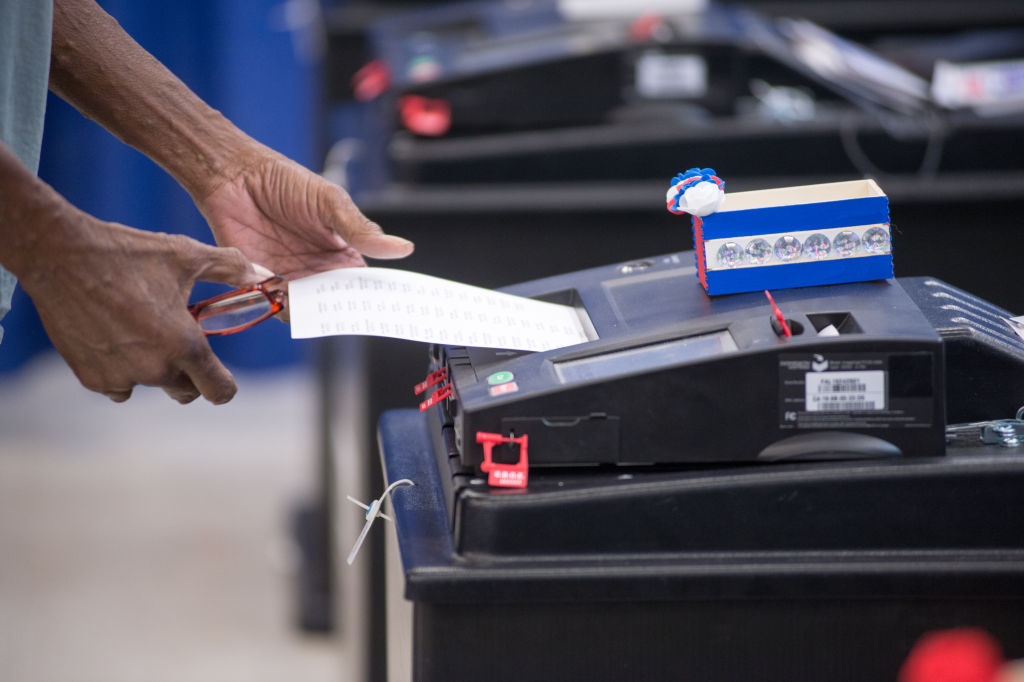
In keeping with Donald Trump’s unwavering stance, elected Republicans follow the party line that the 2020 election lacked legitimacy. But how is the GOP feeling about “election integrity” ahead of 2024? Surprisingly good.
“I think we’re in a much better place right now, at this point in the cycle, than we were—from the conservative election integrity standpoint—than we were in 2020,” said Steve Roberts, a Republican election lawyer, during a Thursday symposium sponsored by the Heritage Foundation and the Harvard Journal of Law and Public Policy.
Roberts is not the only Republican to make such a claim. Though the former president has called on voters to give him a win that is “too big to rig,” his running mate, Sen. J.D. Vance of Ohio, has expressed optimism about the accuracy of next month’s election.
“I believe that we are going to have the safest and most secure election in 2024 that we’ve had because the RNC is fighting for election integrity in a way that it frankly wasn’t four years ago,” he said Wednesday at a rally in Michigan.
Despite the fact that both members of the Republican ticket are still unwilling to acknowledge that Joe Biden won the 2020 race, it’s hardly surprising Vance is sounding an optimistic note about the upcoming election. Prematurely expressing distrust of the election system could depress turnout of the base. However, doing the opposite could blunt postelectoral claims of fraud or other doubts the campaign may want to leverage.
Yet the Republican election law establishment seems determined to put on an upbeat front. The daylong event at Heritage’s headquarters on Capitol Hill focused on “election integrity and the conservative legal movement.”
Roberts participated in a panel discussion titled “Legal Challenges Ahead for the Trump 47 Campaign.” Joining him were Mike Davis of the Article III Project, a conservative legal group; National Review’s Dan McLaughlin; and moderator Daniel Jorjani of Citizens United, a conservative advocacy organization. Roberts praised the Republican National Committee for its work in election litigation this cycle. He also criticized states, both red and blue, that responded in 2020 to the COVID pandemic by “enacting a liberal wish list” that included the removal of witness requirements for mail-in ballots, expanded the use of ballot drop boxes, and more widespread “ballot harvesting.”
“All of that happened in various states in various ways in 2020, sometimes through the legislature, sometimes through courts. But we’re seeing [election safeguards] restored through a lot of hard work by the Trump team, by the RNC, by a lot of you here in this room,” he said.
Some of the examples Roberts listed were recent developments publicized by the RNC. In North Carolina, an appeals court ruled that students at the state’s flagship university could not use digital school IDs as proof of identity for voting. Days later, the RNC said updated guidance from Michigan Secretary of State Jocelyn Benson requiring signature verification of absentee ballots was the result of one of its lawsuits.
Weeks ago, the Pennsylvania Supreme Court vacated—but did not rule on the merits—a decision from a lower court that would have required Allegheny County and Philadelphia County to count mail-in ballots with incorrect or missing dates. “They didn’t give us the affirmative ruling that we were hoping for, but at least that puts us on better footing for Election Day and points moving forward,” Roberts said.
For all of Republicans’ assurances to their voters of security, the panel was noncommittal about whether the Trump campaign will file any legal challenges to the results after Election Day, as it did four years ago.
“The lawyers and the election officials and judges have to follow the law,” said Davis, a Republican lawyer who could be attorney general in a second Trump administration. “If they follow the law, there won’t be challenges, and if they don’t follow the law, there will be challenges.”
Eyes on the Trail
- Vice President Kamala Harris will deliver marks this afternoon at a campaign event in Detroit. In the evening, the Democratic nominee will host a campaign rally in Flint, Michigan. On Saturday, Harris heads to storm-ravaged North Carolina to examine the damage wrought by Hurricane Helene.
- Former President Donald Trump will be in Evans, Georgia, this afternoon, and join Gov. Brian Kemp for a briefing on Hurricane Helene recovery efforts. The Republican nominee, appearing with Kemp for the first time since their falling out over the 2020 presidential election, also will deliver remarks. In the evening, Trump will host a campaign “town hall” in Fayetteville, North Carolina. On Saturday, he will hold a rally in Butler, Pennsylvania, more than two months after surviving an attempt on his life in the same town. On Sunday, Trump heads to Juneau, Wisconsin, to host an afternoon campaign rally.
- Democratic vice presidential nominee Gov. Tim Walz of Minnesota will headline a fundraiser in Cleveland on Saturday.
- Sen. J.D. Vance of Ohio, the Republican vice presidential nominee, will headline a Trump campaign event this afternoon in Lindale, Georgia. He is set to deliver remarks on immigration and border security.
- Second gentleman Doug Emhoff will be in Pittsburgh this evening to deliver remarks at a Harris campaign get-out-the-vote concert, featuring musical artists Jason Isbell and Michael Stipe. On Saturday, Emhoff will be in the New Jersey communities of Red Bank and Old Tappan to headline a pair of “campaign receptions”—likely fundraisers.
- Ben Carson on Saturday evening will be in Livonia, Michigan, to headline a “Believers for Trump” event. Carson served as Housing and Urban Development secretary in the Trump administration.
- The Trump campaign today kicks off a weekend bus tour across Georgia, with Friday stops in Columbus, Macon and Athens; Saturday stops in Fayetteville, Lawrenceville, Atlanta and Kennesaw; and Sunday stops in Rome, Woodstock and Gainesville. Headliners for the events have not yet been disclosed.
Notable and Quotable
“They stole the FEMA money just like they stole it from a bank so they could give it to their illegal immigrants that they want to have vote for them this season.”
—Former President Donald Trump, making a false claim about the Biden administration’s use of disaster-relief funds during a rally in Saginaw, Michigan, October 3, 2024




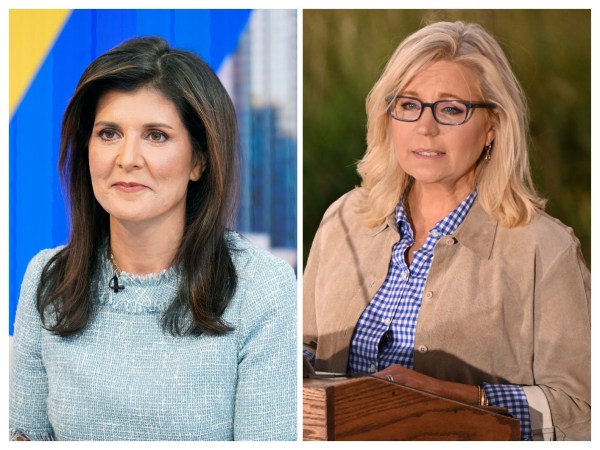

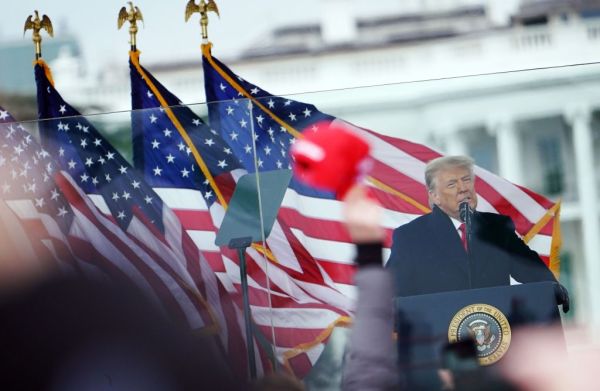



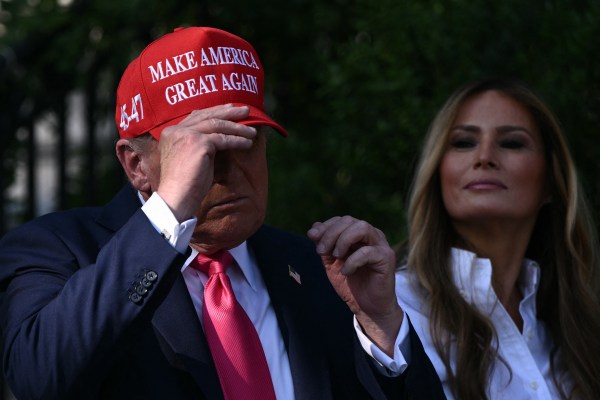

Please note that we at The Dispatch hold ourselves, our work, and our commenters to a higher standard than other places on the internet. We welcome comments that foster genuine debate or discussion—including comments critical of us or our work—but responses that include ad hominem attacks on fellow Dispatch members or are intended to stoke fear and anger may be moderated.
With your membership, you only have the ability to comment on The Morning Dispatch articles. Consider upgrading to join the conversation everywhere.